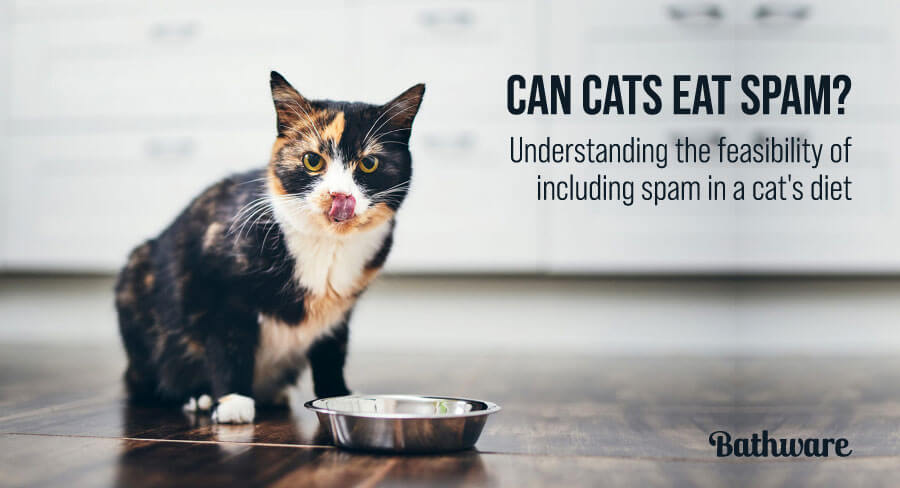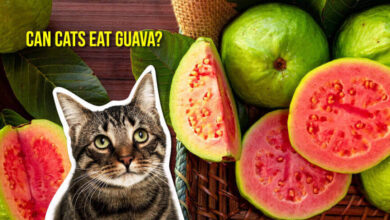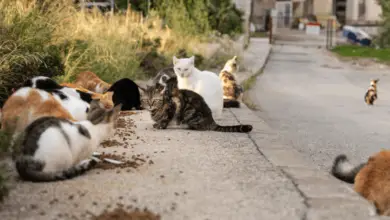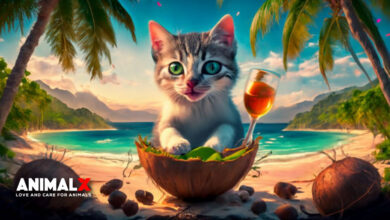Can Cats Eat Spam? A Genuine Guideline
We’re trying to find out an answer to a question – can cats eat spam? Many pet owners are constantly exploring new foods to share with their feline companions, often wondering about human foods like Spam and its suitability for cats. Spam, a canned meat product, is a common pantry item in many households. However, when it comes to our feline friends, questions arise regarding its safety, nutritional value, and potential effects on their health.
In this article, we’ll delve into the world of feline dietary considerations and explore whether cats can eat Spam, shedding light on what’s appropriate and what’s best avoided to ensure the well-being of our beloved furry companions.
Table of Contents
What is Spam?
Spam is a canned meat product that has been a staple in many households for decades. It is a type of processed meat made from a mixture of chopped pork shoulder, ham, salt, water, sugar, and various preservatives. The mixture is then cooked, canned, and sealed for long-term storage. Spam is known for its long shelf life and convenience, making it a popular item in many kitchens. However, its high sodium and preservative content raise questions about its suitability for consumption by pets, including cats.
What is Spam Made of?
Spam is a canned meat product made from a mixture of chopped pork shoulder, ham, salt, water, sugar, and various preservatives. The specific ingredients typically include:
- Pork Shoulder: The main ingredient, providing the base meat for Spam.
- Ham: Adds flavor and contributes to the meaty taste.
- Salt: Used for seasoning and preservation.
- Water: Helps in processing and achieving the desired texture.
- Sugar: Provides a hint of sweetness to the product.
- Preservatives: Various chemicals are used to enhance the shelf life and prevent spoilage.
The mixture is processed, cooked, and then canned to create the final product, known for its long shelf life and convenience. However, it’s important to note that the high sodium and preservative content in Spam may not be suitable for certain dietary needs, including those of cats.
Nutritional Profile of Spam (1 Piece or 34 Grams):
Here’s an approximate nutritional profile for 1 piece or 34 grams of Spam (Note: The values mentioned are approximate and can vary based on the specific brand and variant of Spam.):
| Nutrient | Amount per 34g piece |
|---|---|
| Calories | 93 |
| Total Fat | 8 grams |
| Saturated Fat | 3 grams |
| Cholesterol | 28 milligrams |
| Sodium | 377 milligrams |
| Total Carbohydrates | 0.6 grams |
| Dietary Fiber | 0 grams |
| Sugars | 0 grams |
| Protein | 5 grams |
Can Cats Eat Spam?
Cats can eat Spam, but it’s not recommended. Spam is high in salt and preservatives, which can be harmful to cats. It lacks the essential nutrients that cats need in their diet and should not be a regular part of their meals.
When Is Spam Okay For Cats To Eat?
Ideally, Spam is not okay for cats to eat. However, in exceptional cases where a cat accidentally consumes a small amount, it’s important to monitor them for any signs of distress and contact a veterinarian immediately if any adverse reactions occur.
When Is Spam Bad For Cats?
Spam is bad for cats due to its high salt and preservative content. Excessive salt intake can lead to health issues in cats, such as dehydration, increased thirst, urinary problems, and high blood pressure. Additionally, the preservatives and processed nature of Spam make it an inappropriate and unhealthy choice for a cat’s diet. It’s best to avoid feeding Spam to your cat and opt for a diet tailored to their specific nutritional needs. Always consult a veterinarian for advice on what is safe and appropriate to feed your cat.

What Happens If My Cat Eats Spam?
If your cat eats a small amount of Spam, it may not immediately lead to serious health issues. However, Spam is not an ideal food for cats and can potentially cause various problems:
- Upset Stomach: Cats may experience gastrointestinal upset, including vomiting or diarrhea, due to the processed nature of Spam and its ingredients.
- Dehydration: The high sodium content in Spam can cause increased thirst and urination in cats, potentially leading to dehydration if not addressed.
- Salt Toxicity: Excessive salt intake can be harmful to cats, causing salt toxicity. This may manifest as increased thirst, lethargy, tremors, and in severe cases, it can be life-threatening.
- Nutritional Imbalance: Spam lacks essential nutrients needed for a cat’s well-being. Feeding Spam regularly can result in nutritional imbalances and deficiencies in their diet.
- Weight Gain: Spam is high in fat and calories, which can lead to weight gain if consumed frequently, potentially contributing to obesity-related health problems.
It’s crucial to monitor your cat for any signs of distress after they’ve consumed Spam. If you notice any concerning symptoms or if your cat has consumed a significant amount of Spam, contact your veterinarian immediately. Providing fresh water and a proper diet for your cat is essential for their overall health and well-being.
Read More: Can Cats Eat Oysters?
What to Feed Your Cat Instead
Instead of feeding your cat Spam or other processed human foods, it’s important to provide a nutritionally balanced diet that meets their specific feline needs. Here are recommendations on what to feed your cat:
- Commercial Cat Food: High-quality commercial cat food, whether dry, wet, or semi-moist, is formulated to meet a cat’s nutritional requirements. Look for brands that list meat as the primary ingredient and have essential nutrients like taurine, vitamins, and minerals.
- Fresh Meat: Offer cooked or raw meats such as chicken, turkey, beef, or fish. Ensure they are boneless and cooked without seasoning or additives. Raw meat should be handled and prepared with caution to avoid bacterial contamination.
- Cat Treats: Use cat-specific treats that are formulated to provide a tasty and safe occasional reward. Treats should not constitute a large portion of the cat’s diet.
- Fresh Water: Always provide clean, fresh water for your cat to drink. Hydration is vital for their overall health.
- Consult a Veterinarian for Special Diets: If your cat has specific dietary needs or health conditions, consult your veterinarian for recommendations on specialized diets or supplements.
It’s important to consult your veterinarian for advice on your cat’s specific dietary needs and to ensure you’re providing a well-balanced diet that promotes their health and longevity. Avoid feeding your cat any human food without consulting a veterinarian to prevent potential health issues.
Read More: Can Cats Eat Dates & Its Recipe?
Spam Alternatives for Your Cat
When it comes to providing alternatives to Spam for your cat, it’s important to focus on healthy and cat-safe options that align with their dietary needs. Here are some alternatives to Spam that you can consider for your cat:
- Cat-Specific Treats: Opt for treats designed specifically for cats, ensuring they’re safe, nutritious, and suitable for feline consumption. Choose treats made from high-quality ingredients.
- Cooked Chicken or Turkey: Cooked, plain chicken or turkey without seasoning or additives can be a great protein-rich alternative to Spam. Make sure it’s boneless and cooked thoroughly.
- Fish (in moderation): Offer small amounts of cooked fish like salmon or tuna. Ensure it’s plain, cooked, and free from any seasoning or oils. Too much fish is not recommended due to potential mercury content.
- Catnip or Cat Grass: Catnip or cat grass can be a delightful treat for your cat, providing mental and sensory stimulation. Many cats enjoy playing with and consuming catnip.
- Commercial Cat Treats: Look for commercially available cat treats that are specifically designed to be tasty and safe for feline consumption. Choose reputable brands known for producing high-quality treats.
- Canned Cat Food (in moderation): Canned cat food, especially high-quality options with a high meat content, can be a tasty treat for your cat. Ensure it’s formulated for cats and given in moderation.
Always consult your veterinarian before introducing new foods or treats into your cat’s diet. They can provide personalized recommendations based on your cat’s specific needs and health conditions to ensure a safe and balanced diet for your feline companion.
Read More: Can Cats Have Oat Milk?
My Cat Just Ate Spam. What Do I Do?
If your cat has consumed Spam or any other human food accidentally, here are some steps you can take:
- Assess the Situation: Determine the quantity and ingredients of the Spam your cat consumed. Note the time of consumption and any symptoms if observed.
- Contact Your Veterinarian: Reach out to your veterinarian immediately to inform them about the situation. They can provide guidance based on the amount and type of Spam ingested, as well as your cat’s health history.
- Observe Your Cat: Monitor your cat closely for any signs of distress or unusual behavior, such as vomiting, diarrhea, lethargy, increased thirst, or changes in appetite. Document any symptoms to share with your veterinarian.
- Offer Water: Provide fresh water to keep your cat hydrated. Increased salt intake from the Spam may make your cat thirsty, so it’s essential to ensure they have access to water.
- Avoid Future Access: Keep human food, especially items like Spam, out of your cat’s reach to prevent accidental ingestion in the future.
- Follow Veterinarian’s Advice: Follow any recommendations or instructions provided by your veterinarian, whether it involves at-home care or a visit to the veterinary clinic.
On all occasions, prioritize your cat’s health and well-being. In cases of accidental ingestion, consulting a veterinarian promptly is crucial to ensure appropriate actions are taken to minimize any potential harm.
How to Feed Your Cat a Healthy Diet?
Can Cats Eat Spam? – after getting the answer to this question, you have to understand about the healthy dieat of a cat. Feeding your cat a healthy diet is essential for their overall well-being and longevity. Here are guidelines to help you provide a balanced and nutritious diet for your cat:
- Consult a Veterinarian: Begin by consulting a veterinarian to determine your cat’s specific dietary needs based on their age, weight, health condition, and activity level.
- Choose High-Quality Cat Food: Opt for commercial cat food that is nutritionally complete and balanced, meeting the standards set by reputable pet food associations. Look for products with meat as the primary ingredient and appropriate levels of protein, fat, vitamins, and minerals.
- Understand Cat’s Nutritional Needs: Cats are obligate carnivores and require high-quality protein for optimal health. Ensure their diet includes essential amino acids, like taurine, which are crucial for feline nutrition.
- Provide Fresh Water: Ensure your cat has access to clean, fresh water at all times to prevent dehydration.
- Portion Control and Feeding Schedule: Follow portion control guidelines provided by your veterinarian to maintain a healthy weight for your cat. Stick to a consistent feeding schedule to regulate their appetite.
- Avoid Harmful Foods: Keep toxic foods like chocolate, onions, garlic, grapes, raisins, alcohol, and certain artificial sweeteners (e.g., xylitol) away from your cat.
- Limit Treats and Snacks: Treats should only be given in moderation and should not exceed 10% of your cat’s daily caloric intake. Choose cat-specific treats for optimal nutrition.
- Avoid Table Scraps: Refrain from feeding your cat table scraps or human food, as they may lack essential nutrients and can lead to digestive issues.
- Consider Wet Food: Wet cat food can provide additional hydration and can be a good option, especially for cats prone to urinary tract issues.
- Monitor Your Cat’s Health: Regularly observe your cat for any changes in behavior, appetite, weight, or litter box habits. Report any concerns to your veterinarian promptly.
- Regular Vet Check-ups: Schedule regular veterinary check-ups to monitor your cat’s health and discuss their diet, adjusting it as needed based on their changing needs.
- Special Diets for Health Conditions: If your cat has specific health conditions, your veterinarian might recommend a special diet to address those issues.
By following these guidelines and working closely with your veterinarian, you can ensure your cat receives a healthy and balanced diet that meets their nutritional needs and promotes their overall health.
Can Cats Eat Spam? – Final thoughts
In conclusion, while cats can technically eat Spam, it is not a recommended or suitable food for them. Spam is high in salt, preservatives, and processed ingredients, which can be harmful to cats and may lead to health issues like upset stomach, dehydration, and high blood pressure. Moreover, Spam lacks essential nutrients that cats need for a balanced and healthy diet.
To ensure your cat’s well-being and longevity, it’s best to provide a nutritionally balanced diet specifically formulated for cats. Consult with a veterinarian to understand your cat’s unique dietary requirements and choose appropriate, high-quality cat food to meet their needs. Always prioritize the health and safety of your feline companion by offering foods that support their overall health.
Frequently Asked Questions (FAQs)
Are there any Health Benefits to Cats Eating Spam?
No, there are no health benefits to cats eating Spam. Spam is not nutritionally appropriate for cats and may be harmful due to its high salt, preservatives, and lack of essential feline nutrients.
Can Kittens Eat Spam?
Kittens should not be fed Spam. Their diet should consist of specially formulated kitten food that meets their specific growth and development needs.
How much Spam can Cats Eat?
Cats should not be fed Spam. It’s best to avoid feeding processed human foods to cats altogether.
My Cat ate a Whole Can of Spam. Will he die?
Ingesting a whole can of Spam can be harmful to your cat due to the high salt and preservative content. It’s essential to contact a veterinarian immediately to assess the situation and provide appropriate guidance.
How Can I know if my Cat is Allergic to Spam?
Allergic reactions may manifest as vomiting, diarrhea, itching, skin rashes, or difficulty breathing. If you suspect your cat is allergic to a specific food like Spam, consult a veterinarian for proper evaluation and advice.
Can Cats Eat Turkey Spam?
Turkey Spam poses similar concerns to regular Spam and is not recommended for cats. Processed meats like Spam, regardless of the meat type, should be avoided in a cat’s diet.
Can Cats get addicted to Spam?
Cats can develop a preference for certain foods, but it’s not a true addiction. However, consistently providing unhealthy foods like Spam can create a bad habit and lead to an unbalanced diet, which is not beneficial for their health.
Can Pets Eat Spam?
While pets, including cats and dogs, can consume small amounts of Spam without immediate harm, it’s not recommended due to its high salt and preservative content. It’s best to avoid feeding processed human meats like Spam to pets and instead opt for pet-specific treats and foods.
What Meats Can Cats Eat?
Cats can safely consume various types of meat, including:
– Cooked chicken or turkey (boneless and plain).
– Cooked beef.
– Cooked fish (like salmon or tuna).
– Organ meats (in moderation).
Always ensure the meat is plain, cooked thoroughly, and free of any seasoning or additives.
Can Cats Eat Human Meats?
Cats can consume certain human meats, provided they are cooked and free of seasoning or any harmful additives. However, offering specific meats that are known to be safe and avoiding processed or seasoned meats is essential for a cat’s well-being.
Can Cats Eat Human Junk Food?
No, it’s not recommended for cats to consume human junk food. Junk food is typically high in fat, sugar, salt, and other ingredients that are harmful to feline health. Cats have specific dietary needs, and offering junk food can lead to obesity, gastrointestinal issues, and other health problems. It’s best to stick to a well-balanced cat-specific diet to meet their nutritional requirements.




